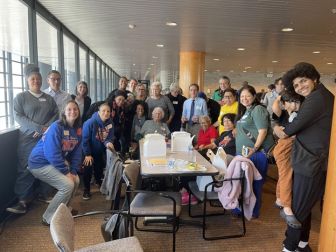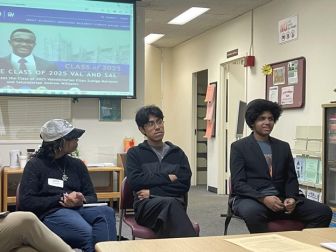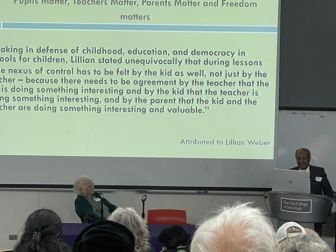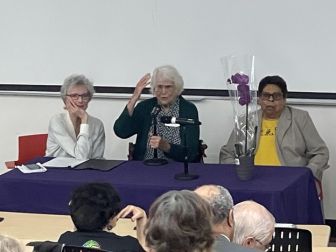In Defense of Childhood, Education, and Democracy—A Powerful Gathering at CCNY
By Kaliris Y. Salas-Ramirez, PhD
May 2025 – On Saturday, May 10, 2025, the School of Education at The City College of New York (CCNY) hosted a remarkable gathering of educators, activists, and students for the conference “In Defense of Childhood, Education, and Democracy: Keeping Active, Inquiry-Based Learning Alive.” It was more than a conference—it was a call to action and a powerful reminder that progressive, inquiry-based learning is not only possible but essential in today’s classrooms. It was a meeting of the minds, an intergenerational space where we convened and celebrated the joy of teaching and learning.
Anchored in the legacy of Lillian Weber and Deborah Meier, two giants of progressive education, the day was alive with vision, dialogue, and solidarity. The opening plenary featured Debbie herself, alongside Lucy Matos, East Harlem native, longtime educator, former director of Central Park East One, and founding principal of the Ella Baker School. Together, they invoked the history of New York City’s pioneering Central Park East schools and the ideals of child-centered, democratic education that continue to inspire educators across generations. Also, a picture of Lillian Weber was displayed on the screen as many spoke about the importance of the Workshop Center for Open Education. It provided a space for teachers to discuss their practices and develop their skills as practitioners. CCNY communicated its commitment, as mentioned by both President Vince Boudreau and Dean Edwin Lamboy, to reestablish the Workshop Center in the School of Education at CCNY. The day concluded with Melissa Avilés Ramos, Chancellor of the New York City Public Schools (NYCPS), speaking about her experiences as a student at CCNY and her training as a holistic educator, centering practices on inquiry. It was a powerful, full-circle day with the past and present coming together. The leadership in the room for transformative educational practices was inspiring.
I was personally overwhelmed with emotion throughout the day. I am a neuroscientist and spent 15 years at CCNY, first as a postdoctoral researcher and then as an assistant professor at the medical school, located in the building across from the School of Education, where the conference took place. Many attendees shared their ties to the college, and though I’m no longer there, mine felt deeply present. I take pride in having CCNY as part of my professional journey, and in being an active member of the education world in New York City for the last dozen years, both as a fellow educator and policymaker.
As a National Advisor for Defending the Early Years, I’m also proud to call Bill Crain a former CCNY colleague, fellow advisor, and conference presenter. But my most meaningful connection to this work is as a parent at Central Park East One Elementary School, where my oldest graduated and my youngest currently attends.
Throughout the day, I beamed. I was in the presence of Debbie and Lucy, two extraordinary educators who embody what makes CPE1 such a special place. The day was filled with reunions and hugs among members of the CPE community, past, present, and future. It was truly moving to hear others share their memories, recognize their contributions to progressive pedagogical practices, and to witness how centering children in teaching practices can be revolutionary.
The program offered a rich array of workshops that embodied these ideals in practice. Educators from across New York City and beyond gathered to explore hands-on, inquiry-driven approaches that place student voice and identity at the heart of learning. Morning sessions, such as “Early Childhood Worktime at CPE 2,” highlighted how choice, independence, and play foster powerful learning environments for young children. “Immigration in Elementary Schools” (led by Rebeca Madrigal from Dos Puentes and Dr. Tatyana Klein, professor at CCNY) and “Exploraciones in Early Childhood” demonstrated how culturally responsive pedagogy and translanguaging practices can create space for all students to engage fully and authentically.
Afternoon workshops continued this momentum. “Reflecting on Reflections,” led by Eleanor Duckworth—a renowned voice in constructivist education and a former student of Jean Piaget—provided a tactile and philosophical exploration of how materials can inspire wonder and thought. “Doing Democracy” with Jim Neujahr and “The Art of Storytelling” with Peggy Pettitt, a Fulbright scholar, reminded participants that voice, choice, and narrative are not luxuries in education—they are necessities for cultivating civic agency and critical thinkers.
The importance of the arts in a well-rounded, inquiry-based education was also deeply affirmed throughout the day. Art education was not treated as a side note but as a central mode of knowing and expressing. In the workshop “Artistic Adventures in Student Identity and Learning,” educators Jamie Cacciola-Price and Jan Valle (current professor at CCNY School of Education) demonstrated how theatre, visual arts, and performance can help students explore identity, understand each other, and build community. Other sessions, such as DeVeor Rainey’s “Community Music Workshop” and Richard Lewis’s poetic “Bird of Imagining,” invited educators to reclaim the creative impulse as a source of deep intellectual and emotional engagement. The student performances—from the Opus 118 Harlem School of Music (led by Roberta Guaspari) and Frank Sinatra High School Jazz Combo (the principal of Frank Sinatra, Gideon Frankel is a CPE1 alumni)—showcased how music and the arts give voice to young people and remind us that joy, expression, and imagination are integral to democracy and to learning. This was especially highlighted while a 5-year-old violinist serenaded the audience in the afternoon.
This conference also provided a space for youth and parents to lead conversations central to the experience of being in schools that center on democracy. A student panel, “The Voices of Young People in Their Experiences at Schools with Performance-Based Assessments,” and the parent panel, “Parent Leaders in Inquiry-Based Schools,” made it clear: inquiry-based, project-centered education transforms not only classrooms but entire communities. They also highlighted how vulnerable these schools are and how vital collective spaces of gathering, learning, creating, and organizing are for the longevity of pedagogical practices that center children.
The session with the youth was significant for me, as I had the opportunity to listen to my son speak about his experience at Central Park East One and School of the Future, alongside a current student at Beacon High School and a graduate of Harvest Collegiate High School. As a neurodivergent child, he discussed feeling seen in his school, connecting current events to other times in history when democracy was under attack, and he celebrated his teachers as being agents of change in his life. His principal, Gabriel Feldberg, was in the room, and I observed him listening to my child, whom he supported for 5 years as a student. As my little one sat next to him in the room, Gabriel shared how proud he was of my oldest son and the power of his words. It is a moment that a parent never imagines they will have, but you get to experience when you are part of a community that fiercely defends childhood and remains dedicated to the students they have served for decades.
Central to the day was the idea that the work of teaching, when done in the spirit of democracy, is always an act of hope. But this hope requires infrastructure. It requires a collective commitment. And it requires institutions that support teachers to be the professionals, innovators, and advocates that our children need. It was evident throughout the discussions that it does not require pre-packaged curriculum, an authoritarian governance structure, or complacency with the status quo.
That’s why it’s time to reestablish and reimagine the Workshop Center for Open Education, supporting teacher autonomy in our schools, especially when it comes to fostering culturally responsive practices and play-based curricula.
Founded by Lillian Weber in the 1970s at The City College of New York, the Workshop Center was a global hub for inquiry-based teacher development. It supported educators in Harlem and beyond to reimagine their classrooms as places of exploration, agency, and joy. It incubated approaches like the Open Corridor, which disrupted traditional classroom isolation and turned school hallways into dynamic learning spaces. It brought teachers together not only to learn from experts, but to become experts themselves through sustained inquiry and reflection.
Educators today, facing top-down mandates, scripted curricula, and standardized assessments (as described by Lauren Monaco, Jia Lee, Martina Meijer, Andrea Castellano, and Dr. Alina Lewis in their panel), are hungry for that kind of space again. A space to breathe. To question. To innovate. To reconnect with the reasons they became educators in the first place. The Workshop Center was, and could be again, a lifeline.
During the afternoon plenary, Professor Hubert Dyasi, who succeeded Lillian Weber as Director of the Workshop Center, issued a compelling charge: We must make child-focused, inquiry-based learning visible again. He reminded us that “students raising their own questions to investigate… that is now totally strange in schools.” We cannot allow that strangeness to become normal.
The reestablishment of the Workshop Center is not just about reviving a program—it is about restoring a vision. A vision of schooling that recognizes children as thinkers, teachers as intellectuals, and education as the cornerstone of democracy.
This conference proved that the network is here. The passion is here. The wisdom is here. Now, we need the institutional courage to match it. Some of the individuals leading the way are the CCNY School of Education, the CCNY Workshop Center for Open Education committee, the committee celebrating the 50th anniversary of the Central Park East schools, and the Progressive Education Network of New York (PENNY), an impressive coalition.
To educators, student teachers, parents, and professors reading this: know that you are part of a vibrant and determined lineage. From the classrooms of CPE to the farm sanctuaries of Bill Crain’s work, from the poetic classrooms of Richard Lewis to the politically conscious practices of teachers in the MORE Caucus of the UFT, the torch of progressive education is still burning. Let us keep it alive, together.
Let us demand, create, and protect the spaces where children can be curious, teachers can be bold, and democracy can take root.
For our students. For our schools. For our shared future. Because the past has definitely provided a strong foundation.
Kaliris Y. Salas-Ramirez, Ph.D., is an Associate Professor, Neuroscience and Cell Biology, Rutgers University – Robert Wood Johnson Medical School, National Advisor for Defending Early Years, former NYC School Board Member, current parent at Central Park East One




